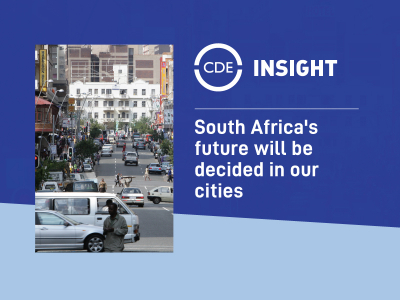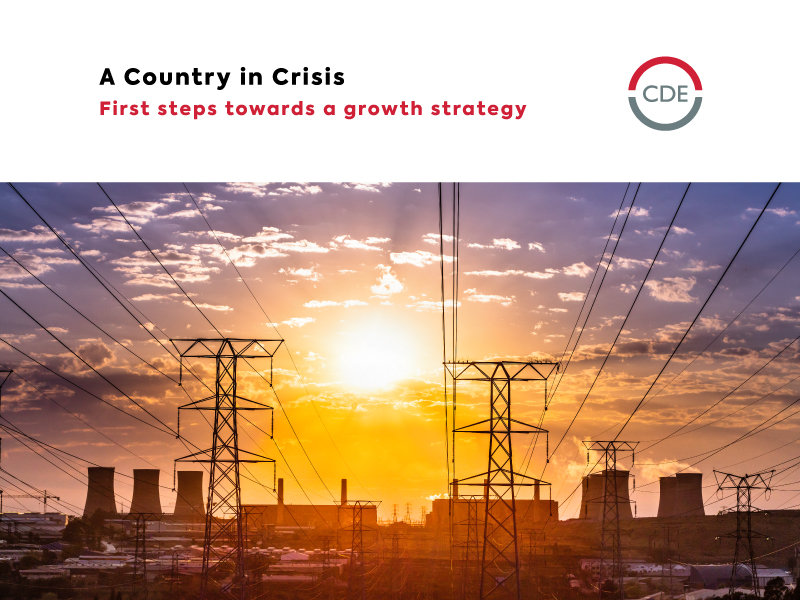
South Africa’s future will be decided in our cities – a report released today by one of SA’s leading think tanks, the Centre for Development and Enterprise (CDE), argues that South Africa can only succeed if its cities work effectively.
Ann Bernstein, executive director of CDE, said: “South Africa’s cities face multiple, overlapping and interconnected challenges. They are, nonetheless, the country’s best hope for turning our economy and manifold social crises around.”
Improving the governance of our cities is paramount: “We need urgently to address the lack of skills, experience, and integrity across all levels of management in many of our cities. This means ensuring that officials are qualified to do their jobs, and a way is found to stabilise local governing coalitions with competent political leadership,” said Bernstein.
“South Africa’s metros should not be a political landing space for those who cannot make it in national politics,” she added.
In its report, CDE notes that throughout history and across the globe, cities have been at the heart of social, cultural, political and especially economic progress.
“South Africa’s cities are the places where it should and could be possible to find opportunity for the poor and create prosperity for the many. If they are to become cities of hope we will need significant changes.”
Cities work best when workers and employers are in close proximity to each other, reducing the costs of finding opportunities and of getting to and from work. High density is also good for firms because of their proximity to large numbers of potential customers.
But density levels in South Africa’s cities are dysfunctionally low. Post-apartheid housing policy has often perpetuated the creation of urban settlements for poorer people far from all the opportunities of cities and agglomeration.
“Cities need to support and encourage densification through investment in infrastructure, improving their own urban management capabilities and releasing state-owned land for high-density housing. National government support to strengthen metros in coping with densification is essential,” says Bernstein.
One of the challenges cities face in promoting densification is that the process of approving development projects is complex and frequently delayed by long processes of consultation. Cities need to adopt an approach to new projects that is biased towards approval and implementation, actively pushing projects and proposals through these processes.
While townships face severe infrastructural deficits and investment in municipal infrastructure is desirable, Bernstein said, “There is no real prospect that some combination of regulation and preferential procurement policies can stimulate economic growth along the lines envisaged by the vaguely defined ‘township economies agenda’.”
International experience of place-based policies shows that they only succeed in areas that already have relatively dynamic local economies and which probably would have developed even in the absence of special place-based policies.
South Africa’s cities need much improved public transport. Current arrangements are failing most workers and work-seekers because of our low densities and because policies and institutions – national, provincial and local – responsible for public transport are not fit for purpose.
“Significant redesign is needed, and city leaders should be shouting from the rooftops for this,” says Bernstein. The devolution of commuter rail operations from a dysfunctional Passenger Rail Association of South Africa (PRASA) to local agencies is essential.
Cities should play a more prominent role in national debates about issues that affect their ability to create the best environment possible for economic growth, employment and inclusion. Besides rail, another area ripe for devolution is policing.
Most law enforcement powers vest in national government, so cities must both support policing and prosecution (e.g., by implementing technological solutions that make the identification of offenders easier such as smart CCTV cameras) and campaign vigorously for improved policing or greater control over policing in their jurisdictions.
Most city governments do not understand or fully appreciate how business works. Urban governments need to allow the power and efficiency of enterprises operating in competitive markets to drive their economies. By focusing on the needs of business, a better environment for growth will emerge, jobs will be created, workable public-private partnerships can be established, and investments in infrastructure are more likely to yield economic returns.
According to Bernstein: “Our cities are failing to deliver on their potential to become growth, jobs and opportunity-generating machines. If they are to become cities of hope, we need to re-think our urban areas and how to govern them.”
“In particular, it is vital that steps are taken to stabilise city politics and to ensure that their leadership has sufficient space and political capital to authorise the policy changes that are needed. This may require meaningful political realignment, a process that – given the fraught character of existing party politics – may require pressure from civil society, including organised business, if it is to succeed,” she added.
For media enquiries and interview requests, please contact Refiloe Benjamin: media@cde.org.za | 011 482 5140
ABOUT THIS REPORT
South Africa’s future will be decided in our cities is a new report from CDE. It is based on CDE work on cities over many years and five specially commissioned papers from leading local and international economists to generate new insights and inspire further research on the economics of cities in South Africa. The project was done in collaboration with Economic Research South Africa (ERSA) whose involvement and support were critical to the project’s success. We were fortunate to enlist the participation of Professor Ed Glaeser, one of the world’s leading urban economists and currently chairman of the economics department at Harvard University. To access the five papers click here.
To read the full report: click here.
ABOUT THE CENTRE FOR DEVELOPMENT AND ENTERPRISE
CDE is an independent policy research and advocacy organisation. It is South Africa’s leading development think tank, focusing on critical development issues and their relationship to economic growth and democratic consolidation. Through examining South African realities and international experience, coupled with high-level forums, workshops and roundtables, CDE formulates practical policy proposals outlining ways in which South Africa can tackle major social and economic challenges.



